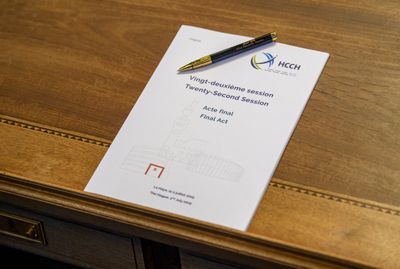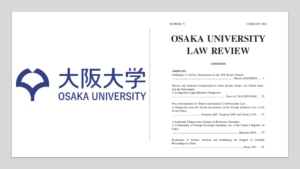Views
Change of gender in private international law: a problem arises between Scotland and England
Written by Professor Eric Clive
The Secretary of State for Scotland, a Minister of the United Kingdom government, has made an order under section 35 of the Scotland Act 1998 blocking Royal Assent to the Gender Recognition Reform (Scotland) Bill 2022, a Bill passed by the Scottish Parliament by a large majority. The Scottish government has challenged the order by means of a petition for judicial review. The case is constitutionally important and may well go to the United Kingdom Supreme court. It also raises interesting questions of private international law.
At present the rules on obtaining a gender recognition certificate, which has the effect of changing the applicant’s legal gender, are more or less the same in England and Wales, Scotland and Northern Ireland. The Scottish Bill would replace the rules for Scotland by less restrictive, de-medicalised rules. An unfortunate side effect is that Scottish certificates would no longer have automatic effect by statute in other parts of the United Kingdom. The United Kingdom government could remedy this by legislation but there is no indication that it intends to do so. Its position is that it does not like the Scottish Bill.
One of the reasons given by the Secretary of State for making the order is that having two different systems for issuing gender recognition certificates within the United Kingdom would cause serious problems. A person, he assumes, might be legally of one gender in England and another in Scotland. There would therefore be difficulties for some organisations operating at United Kingdom level – for example, in the fields of tax, benefits and pensions. This immediately strikes a private lawyer as odd. Scotland and England have had different systems in the law of persons for centuries – in the laws on marriage, divorce, legitimacy, incapacity and other matters of personal status – and they have not given rise to serious problems. This is because the rules of private international law, even in the absence of statutory provision, did not allow them to.
Judgments Convention – No Thanks?
On September 1st, 2023, the 2019 Hague Judgments Convention will enter into force for the Member States of the EU and Ukraine. According to the HCCH, the Convention is “a true gamechanger in international dispute resolution”, which will “reduce transactional and litigation costs, facilitate rule-based multilateral trade and investment, increase certainty and predictability” and “promote effective justice for all”. The international conference taking place in Bonn later this week will likely strike an equally celebratory tone.
This sentiment is not shared universally, though. In a scathing article just published in Zeitschrift für Europäisches Privatrecht (ZEuP) entitled ‘Judgments Convention: No Thanks!‘, Haimo Schack (University of Kiel) labels the Convention as “evidently worthless”.

Schack comes to this damning conclusion in three steps. First, he argues that the 2005 Choice of Court Convention, the first outcome of the decades-long HCCH Jurisdiction Project, has been of minimal use for the EU and only benefited Singapore and London. Read more
Towards an EU Regulation on the International Protection of Adults
On 31 May 2023, the European Commission presented a proposal for a Regulation on jurisdiction, applicable law, recognition and enforcement of measures and cooperation in matters relating to the protection of adults (in the following: EU Adult Protection Regulation – EUAPR). This proposal is a response to significant demographic and social changes in the EU: Many Member States face enormous challenges posed by an increasingly aging population. Due to considerable improvements in medical care in recent decades, people grow much older than they used to, and this lengthening of the average lifespan in turn leads to an increase in age-related illnesses such as Alzheimer’s disease. This demographic change creates problems for private international law, because the mobility of natural persons has increased within the EU where borders may, in principle, be crossed without restrictions. Many people who have left their state of origin in search for work elsewhere in their youth or middle age do not return to their home state after retirement, but rather spend the last part of their lives where they have established a new habitual residence. Besides, more and more people decide to leave their home state once they have reached the age of retirement. Such processes of migration at a late stage in life may have different reasons: Some old-age movers may want to avoid a heavy taxation of their estates that would put a burden on their heirs, some may wish to circumvent other restrictions of domestic inheritance laws (e.g. the right to a compulsory portion), others may simply wish to spend the remaining parts of their lives in milder climates, e.g. the Mediterranean, or look for a place to stay where the cost of living is lower, e.g. in some parts of Eastern Europe. When these persons begin to suffer from an impairment or an insufficiency of their personal faculties which no longer allows them to protect their interests themselves, however, intricate conflict of laws problems may arise: The authorities or courts of which state shall have jurisdiction to take protective measures concerning vulnerable adults or their property? Which law is to be applied to such measures? Under which conditions may protective measures taken in one state be recognised and enforced in other states?
The EUAPR is meant to solve these problems. Read more
News
Out Now: The Latest Issue of the Japanese Yearbook of International Law (Vol. 67, 2024)
 The Japanese Yearbook of International Law (JYIL) is a leading reference publication that provides in-depth analysis and commentary on developments in international law from a Japanese perspective.
The Japanese Yearbook of International Law (JYIL) is a leading reference publication that provides in-depth analysis and commentary on developments in international law from a Japanese perspective.
Published by the International Law Association of Japan since 1957 (originally as the Annual Yearbook of Private International Law until 2007), the JYIL covers a broad spectrum of topics, from public and private international law to comparative law, bringing together insights from top scholars and legal experts in Japan and beyond.
Each issue dives into key legal cases, legislative updates, and emerging trends, making it a must-read for researchers, academics, and professionals looking to stay in the loop on Japan’s legal landscape.
On that note, the latest volume of the JYIL (Vol. 67, 2024) has recently been released. Readers of this blog may find particular interested in selected articles, case notes, books review and English translations of court decisions related to private international law.
New Titles on Conflict of Laws in the Latest Issue of the Osaka University Law Review

The OSAKA UNIVERSITY LAW REVIEW (OULR) is a prestigious international academic journal on law and politics with a rich history. Published annually by the Graduate School of Law and Politics at Osaka University since 1952, the OULR offers a valuable platform for discussing and sharing information on Japanese law and politics, all presented in English and other foreign languages including French and German from a comparative law perspective.
The OULR’s ultimate goal is to foster debate and facilitate the exchange of ideas between Japanese and international scholars, while promoting and disseminating original research in the fields of Japanese law and politics and other related areas.
That said, the latest volume (No. 72) features some papers that might be of interest to the readers of this blog, as well as researchers and practitioners of private international law. These papers highlight important legal developments in China, particularly in the areas of international civil procedure and sovereign immunity.
3 new books on Portuguese (and European) PIL
For those able to read Portuguese, 3 new books of great interest have been published in the last months.
In January 2025, Professor Luís de Lima Pinheiro published a new, 4th edition of Volume I of the treatise on Private International Law. In more than 600 pages, the book gives an introduction to Conflict of Laws and deals with the General Part of this field. Along with the in-depth analysis of all those subjects, a comprehensive list of legal literature can be found at the beginning of each Chapter.
In November 2024, Professor Dário Moura Vicente published the 5th volume of his PIL “Essays” collection. It gathers 22 scholarly contributions of the author divided into five categories, namely general issues of Private International Law, jurisdiction and recognition of foreign judgments in the EU, international unification of Private Law, the information society and its international regulation, and international arbitration.
And in October 2024, Professor Elsa Dias Oliveira published a book on Conflict of Laws in the EU. It deals with the «general part» issues that for decades have been puzzling many European private international lawyers, due to the fact that for some of them, such as renvoi or ordre public, we may find explicit rules in many PIL regulations, while for others, such as characterization or the application of foreign law, that is not the case.


